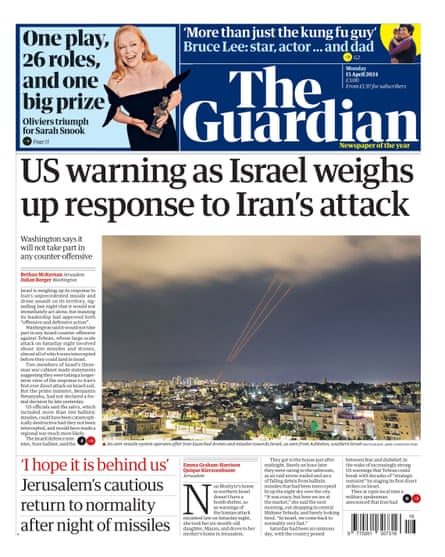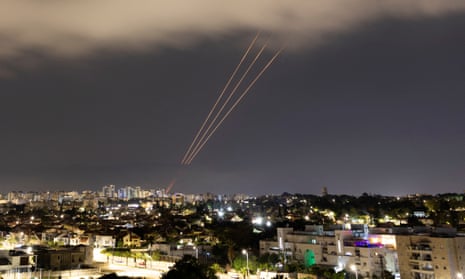Good morning. For the first time, Iran has launched a direct attack against Israel from its own soil – and the Middle East stands closer to an all-out regional war than at any point since 7 October.
Tehran has claimed that it now views the exchange, prompted by an Israeli attack on the Iranian consulate in Damascus, as over. The United States, meanwhile, said that it does not seek war with Iran. The crucial question is whether Benjamin Netanyahu feels the same way – and while two members of his war cabinet signalled on Sunday night that there would be no immediate response, there was no word from the prime minister himself.
Key to what might happen next is how well each side understands the other’s calculations, with any misinterpretation risking an accidental escalation. For today’s newsletter, I spoke to Mohammad Ali Shabani, editor of Amwaj.media, a news website covering Iran, Iraq and the Arabian peninsula, about the two sides’ strategic goals, the red lines beyond which they will feel compelled to respond, and the difference between the rhetoric and the reality. Here are the headlines.
Five big stories
Disability | The rollout of universal credit is on course to make thousands of working-age disabled people significantly poorer, a new report has warned. A single person with a long-term disability that prevents them from working is £2,800 a year worse off when they transfer to universal credit (UC), the Resolution Foundation said.
Sydney stabbings | The family of the Bondi Junction attacker have described his actions as “truly horrific”, offered condolences to the loved ones of the victims and expressed support for the police officer who ended the attack by shooting him dead. Police say Joel Cauchi had mental health problems and moved from Queensland to New South Wales a month before he killed six people in Sydney on Saturday.
Health | The British government was willing to risk infecting NHS patients to get “lower-priced” blood products, according to a document that campaigners claim proves state and corporate guilt in one of the country’s worst ever scandals. Internal company minutes produced by Immuno AG in 1976 say that “the British market will accept a higher risk of hepatitis for a lower-priced product”.
Childcare | England’s childcare system is falling behind those of much of the rest of the world, a UK charity for gender equality and women’s rights has said. A report by the Fawcett Society found that the English system was “crumbling” in comparison to other countries undergoing significant reform.
Theatre | Jamie Lloyd’s bombastic reimagining of Sunset Boulevard was the standout show at this year’s Olivier awards, with seven wins including best actress in a musical for Nicole Scherzinger. Mark Gatiss and Sarah Snook also won acting awards, while best new play went to James Graham’s football drama Dear England. See pictures from the ceremony.
In depth: ‘What happened was a spectacle – geared to make the world see’

After Israel bombed an Iranian consular building in Damascus on 1 April, killing a top Islamic Revolutionary Guards general and six other officers, Iran promised that it would take its revenge. Now we know what that means.
Around 300 Iranian drones and missiles were sent towards Israel from Iran on Saturday night – and although almost all of the launches were intercepted, with the assistance of Israeli allies including the US, UK, and Jordan, they still represented a significant departure from the parameters of the shadow war that has rumbled for the last six months. Here’s a visual guide to Saturday’s attack, and here’s what we know on Monday morning.
“The operation was heavily telegraphed and choreographed by Tehran,” Mohammad Ali Shabani said. “But it was still more than most analysts expected, including myself.”
What was the intention of the Iranian attack?
While Israel claimed that 99% of the launches had been thwarted and that “the Iranian attack has been foiled”, Iran insisted that the operation was a success, destroying an Israeli intelligence centre close to the Syrian border and an airbase. Crucially, chief of the general staff Gen Mohammad Bagheri said that the operation was “over and there is no intention to continue it”. The public message, in other words, is that the score has been settled.
A senior political source in Tehran told amwaj.media that “Iran deliberately tried to prevent casualties to prevent a continuation of the conflict”, he added. “Having said that, they’re also messaging that next time, that will not be the case. Lots of capabilities have not been deployed – for example, Hezbollah [which operates on the Lebanese border with Israel with Iranian backing] did not really get involved.”
In 2013, writing about the Obama administration’s relationship with Iran, Shabani said that there were two key concepts to understand, summarised by two words in Persian: “mashalat”, translated as expediency, and “aberu”, which means face – and denotes saving face. Since the Islamic revolution, he wrote, “expediency has been a pillar of decision making, but within a framework that has allowed Iranian leaders to save face”.
Those principles are still relevant today. “What happened was a spectacle – geared to make the world see,” Shabani said. “So there is a face-saving component. But it was signalled in advance, so that there was ample time for Israel and the United States to prepare. They are saying that the ball is now in Israel’s court.”
What are the internal dynamics in Tehran?

Since 2018, when Donald Trump withdrew the US from the deal designed to limit Iran’s nuclear programme, “there has been a very clear political shift in Tehran toward the conservative end of the spectrum”, Shabani said. “We have seen reformist, and even moderate conservative, voices eliminated.”
The reformist former president Hassan Rouhani, who signed the nuclear deal, was disqualified from re-election to the Iranian assembly of experts in last month’s elections. “There was no genuine range of candidates – just a contest between hardliners and more pragmatic conservatives.”
Today, Shabani added, “all centres of power in Iran are completely dominated by conservatives, and the hardliners are in the ascendancy. That means that there are fewer people in the room arguing for options that are less escalatory.”
At the same time, Shabani said, “even with the US out of the nuclear deal and Biden keeping the Trump-era sanctions, they are still talking – maybe through intermediaries, but they are still talking. They could have done a North Korea and cut off all contact, but they haven’t. What that suggests is that even with the conservatives building power, there is still a strong constituency in favour of diplomacy.”
What are Benjamin Netanyahu’s calculations?
“The attack in Damascus was not an isolated event,” Shabani said. “There have been multiple, quite public, assassinations of very high ranking figures in the Islamic Revolutionary Guard Corps. I would guess that the Israeli view was that this either attracts a response, which could drag the United States into a war on their side, or there is not a response, in which case they have eliminated a threat. It’s win-win.”
Another possible incentive for the initial attack: the $14bn US funding package for Israel currently stuck in Congress. “Suddenly, you have American politicians saying that the US must do everything in its power to support Israel,” Shabani said. There is now new pressure for the Republican-controlled House to pass an aid bill also covering Ukraine – and the public conversation has shifted from tensions between Israel and the US to Biden’s “ironclad” commitment of support.
Yesterday, Benny Gantz, a member of the Israeli war cabinet, said that “we will build a regional coalition and exact the price from Iran in the fashion and timing that is right for us”. While that language might appear belligerent, it was at least interpreted as an indication that Israel will not act immediately and without consultation.
But that does not preclude an escalatory response – even if, as Emma Graham-Harrison and Quique Kierszenbaum report from Jerusalem, many ordinary people hope that the confrontation is over. “I would distinguish between Netanyahu’s interests and Israel’s,” Shabani said. “The only way for him to remain in office is to continue the conflict, and the only way to continue it is to expand it. But we don’t know what will happen next. An attack on mainland Iran would be a further step up the escalation ladder – a cyber-attack is much lower risk.”
What will the US strategy be?
The US has indicated that it was given no prior warning about the Damascus attack. And Biden, pictured above with his national security advisers, is reported to have suggested to Israel that its success in thwarting the Iranian airstrikes was a sufficient victory in its own right.
But Netanyahu is perhaps more likely to respond to concrete incentives than persuasion. “Since 7 October, Biden has been increasingly critical of Netanyahu, but there has been no cessation of arms exports or conditions attached,” Shabani said. “After the bombing of the embassy complex, the US refused to condemn it, and there was no statement from the UN security council because of the US’s stance. Iran has claimed that a UNSC condemnation would have meant that it did not feel compelled to respond. We don’t know if that’s true, but it is a measure of how the diplomatic game is being shaped.”
Even so, he added, there is a curious sense in which US interests are better aligned with its old adversary Iran’s than with its ally Israel’s. “It is a bizarre dynamic that doesn’t escape anybody watching closely. Neither side wants an all-out war.” That may help lay the ground for indirect concessions from Washington to Tehran – for example, in nuclear talks – to avert further escalation.
after newsletter promotion
“It makes sense for the Iranians to try to use this as an opportunity in other fields, and I think that’s not a bad bet,” Shabani said. “But it would be politically catastrophic for Biden to be seen to be dealing with Iran right now.” In all, he said, “I think it’s not useful to try to predict the future in black and white forms. But the risks of misunderstandings are very real. And we still don’t know where the two sides’ thresholds will be.”
What else we’ve been reading

Birmingham has more allotments than any local authority in the UK. For an edition of the Observer New Review guest edited by Joe Lycett and focussed on his home town, Rebecca Nicholson made a deeply cheering trip to the Dads Lane site (above), where the denizens delight in the enforced slowness of life: “You can’t go quickly, and that’s beautiful”. Archie
Moya Sarner’s latest tip to improve your life: get to know your superego, that internal voice – so often critical – that holds us back: “you cannot build a better life by running away from yourself”. Toby Moses, head of newsletters
One year after the civil war in Sudan began, “there is still a sense of whiplash, of disbelief that it has actually happened,” writes Nesrine Malik. “More jarring is that the world has gazed with indifference upon this crucible of war.” Archie
Much has been written about what a Labour government won’t do, less so about what they will – Michael Savage takes a look at what the first 100 days of a Keir Starmer premiership might try to achieve. Toby
The Conservatives’ terrible online adverts have been a source of much mirth and confusion, so Jonn Elledge has taken a look for PoliticsHome at a sign of malaise at CCHQ or whether this is deliberate “shitposting” in order to go viral: “most of the comms professionals approached for this piece preferred a simpler explanation: someone sucks at their job”. Toby
Sport

Premier League | Manchester City had a great Sunday with both title rivals, Arsenal and Liverpool, losing at home. Aston Villa defeated Arsenal 2-0 thanks to late goals from Leon Bailey and Ollie Watkins, pictured above, while Liverpool lost 1-0 to Crystal Palace. City are now two points clear at the top of the table.
The Masters | Unflappable American Scottie Scheffler claimed a second Masters title in three years on Sunday, the world number one holding steady while his biggest challengers self-destructed. Scheffler, the Green Jacket winner in 2022, began the day with a one-stroke lead and posted a final round of four-under 68 to finish four clear of Swedish young gun Ludvig Aberg.
Women’s FA Cup | Manchester United defeated holders Chelsea 2-1 to set up a final against Tottenham, who needed extra time for their own 2-1 win against Leicester. The results mean that a team other than Arsenal, Chelsea or Manchester City will win the tournament for the first time since 2005.
The front pages

“US warning as Israel weighs up response to Iran’s attack” is the Guardian’s print splash this morning. “Iran risks ‘uncontrollable’ wider war with Israel attacks, G7 nations warn” – that’s the i while the Daily Mirror says “Step back from brink”. The Daily Mail has the words of Israel’s president: “It’s time the world faces evil empire in Tehran”. The Metro calls it a “Rain of terror”. “World holds its breath as Israel vows to ‘exact a price’” says the Daily Express, while the Sun goes all Biggles: “RAF top guns foil Iran blitz”. The Financial Times says “Israel weighs options after Iran attack”. The Times goes with “Israel vows revenge as the world calls for calm” while on page one of the Daily Telegraph it’s “Israel plans revenge attack on Iran as west urges restraint”.
Today in Focus

How Swiss women won a landmark climate case for Europe
Last week a group of older women successfully challenged the Swiss government’s climate policies at the European court of human rights. Isabella Kaminski reports
Cartoon of the day | Nicola Jennings

The Upside
A bit of good news to remind you that the world’s not all bad

When Notre Dame went up in flames in 2019 it was hard to believe anything within its walls would be salvaged. But four years later a unique collection of 17th-century religious paintings is to go back on display. The 13 “Mays” – part of a series of 76 large oil works painted by the best artists in France between 1630 and 1707 – had hung in the cathedral’s dimly lit side chapels, and after loving restoration by experts from Mobilier National, the cultural body charged with conserving France’s historical objects, they are ready to be shown to the public again. “We were lucky to get them out quite quickly with just a little water damage and dust,” said Emmanuel Pénicaut, director of Mobilier National collections. “It was rather miraculous.” The treasures of Notre Dame will be on display at the Mobilier National from 24 April to 21 July.
Sign up here for a weekly roundup of The Upside, sent to you every Sunday
Bored at work?
And finally, the Guardian’s puzzles are here to keep you entertained throughout the day. Until tomorrow.
